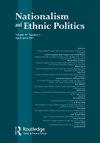宗派社会背景下的社区间关系:黎巴嫩马龙派教徒的社区恐惧产生了日常行为和应对机制
IF 1.1
Q3 ETHNIC STUDIES
引用次数: 1
摘要
本文探讨了为什么通过人口和政治经济因素产生的社区恐惧可以解释不同种族、宗教和宗派多元社会中的群体行为(这里是黎巴嫩的马龙派教徒),而不是严格依赖结构和工具解释。它认为,在对群体生育率、移民模式、土地所有权和工农业份额等的政治、社会经济和人类学解释中根深蒂固的集体恐惧,可以解释马龙派教徒倾向于在某些(种族-宗教定义的)地区购买土地、从事特定工作和支配某些经济部门的日常做法。虽然我们承认个人认知-黎巴嫩公民的能力-在摆脱群体思维的束缚方面的作用,但我们发现许多普遍存在的政治,经济和社会因素重申了多元社会中的群体团结;因此,在解释群体成员如何采取日常做法来对冲感知风险时,公共恐惧的概念变得有用。本文章由计算机程序翻译,如有差异,请以英文原文为准。
Inter-Communal Relations in the Context of a Sectarian Society: Communal Fear Spawns Everyday Practices and Coping Mechanisms among the Maronites of Lebanon
Abstract This paper explores why the production of communal fear via demographic and political-economic factors can explain group behavior (here the Maronites of Lebanon) in diverse ethnic, religious and sectarian plural societies rather than a strict reliance on structural and instrumental explanations. It argues that communal fear, deeply entrenched in political, socioeconomic and anthropological interpretations of groups’ fertility rates, migration patterns, land ownership and shares of industry and agriculture inter alia, can explain Maronites’ everyday practices of preferring land purchases in certain (ethno-religiously defined-) areas, occupying specific jobs and dominating certain economic sectors. While we acknowledge the role of individual cognition—Lebanese citizens’ ability—in breaking away from the clutches of group thinking, we find that many pervasive political, economic and social factors reaffirm group solidarity in plural societies; thus rendering useful the concept of communal fear in explaining how members of groups adopt everyday practices to hedge against perceived risks.
求助全文
通过发布文献求助,成功后即可免费获取论文全文。
去求助
来源期刊

Nationalism and Ethnic Politics
ETHNIC STUDIES-
CiteScore
1.30
自引率
0.00%
发文量
30
期刊介绍:
Nationalism & Ethnic Politics explores the varied political aspects of nationalism and ethnicity in order to develop more constructive inter-group relations. The journal publishes case studies and comparative and theoretical analyses. It deals with pluralism, ethno-nationalism, irredentism, separatism, and related phenomena, and examines processes and theories of ethnic identity formation, mobilization, conflict and accommodation in the context of political development and "nation-building". The journal compares and contrasts state and community claims, and deal with such factors as citizenship, race, religion, economic development, immigration, language, and the international environment.
 求助内容:
求助内容: 应助结果提醒方式:
应助结果提醒方式:


